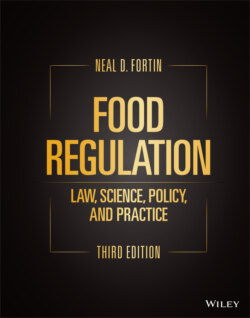Читать книгу Food Regulation - Neal D. Fortin - Страница 29
1.4.3 Adjudication
ОглавлениеJudging noncompliance and imposing penalties for violation of regulations may also be a part of an agency’s responsibility (if so authorized by statute). Agency adjudication is an agency hearing, somewhat similar to a judicial proceeding, but typically conducted before an agency official acting in the capacity of an administrative law judge (or hearing referee). Agency adjudication is less formal than most judicial proceedings. An adjudicatory hearing deals with specific parties and facts; it establishes what happened and prescribes what is to be done, including determining penalties. For example, a state agriculture department might conduct an adjudication proceeding in which it first establishes the facts as to whether a food establishment violated applicable sanitation standards and then whether revocation of the establishment’s license is warranted.
Thus, an administrative agency can serve as the lawmaker, the prosecutor, and the judge, all rolled into one. This does not necessarily violate the principle of separation of powers. The rationale is that administrative agencies have narrow areas of technical expertise, they are controlled by numerous procedural requirements, and these decisions always may be appealed to the court system. Due process and the APA specify that agencies, when engaged in adjudication, must provide a person notice of the case against him or her, and a meaningful opportunity to present their case. In some cases, the determination must be made by trial‐type proceeding.35
While court challenges of agency adjudications are not uncommon, it should be noted that those challenges are usually based on procedural, rather than substantive grounds. The courts are enormously deferential to an agency’s expertise, and are unlikely to interfere with the substantive decisions made by an agency.36 Procedural challenges are much more likely to be successful, and also provide greater advantage for negotiated settlements or delays in the implementation of the agency’s decision. For example, a grocery store may challenge an agency’s decision to revoke their license due to insanitary conditions. However, the challenge is far less likely to be successful on the basis that the agency was incorrect in its professional judgment that the store was insanitary (a substantive challenge), as opposed to the challenge that the agency failed to consider all pertinent evidence in the record because it failed to properly notify the establishment (procedural challenges). A court is far less likely to overturn the agency’s decision on the seriousness of the insanitation than to find there was a procedural deficiency.
